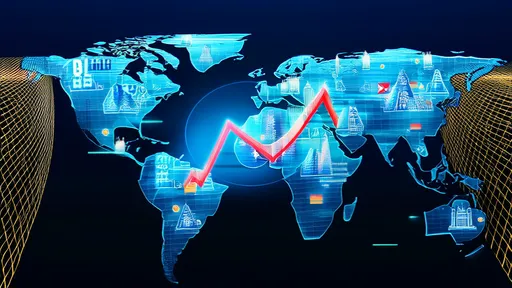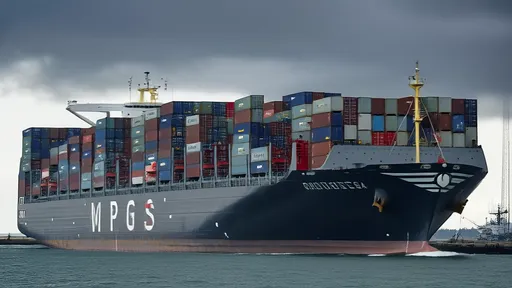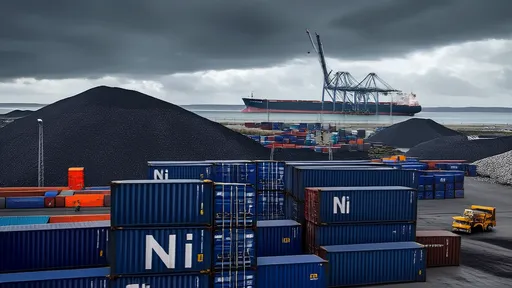The UK's post-Brexit economic landscape continues to face significant headwinds, with recent data revealing a record-high trade deficit and persistent contraction in the manufacturing sector. These developments have reignited debates about the long-term consequences of leaving the European Union, as British businesses struggle to adapt to new trade barriers and supply chain disruptions.
The Office for National Statistics reported that Britain's goods trade deficit widened to £27.9 billion in the final quarter of 2023, the largest gap since records began in 1997. This troubling figure comes alongside a 1.8% quarterly decline in manufacturing output, marking the fifth consecutive quarter of contraction for the sector that once formed the backbone of the UK economy.
Trade experts point to the cumulative effect of non-tariff barriers with the EU as a primary driver of these trends. "The paperwork, customs checks, and regulatory divergences have created friction that smaller exporters simply can't absorb," explains Dr. Sarah Williamson, a trade policy analyst at the London School of Economics. "What we're seeing isn't just a temporary adjustment but structural damage to Britain's export capacity."
The automotive industry provides a stark illustration of these challenges. Once thriving through just-in-time supply chains spanning the Channel, UK car production has plummeted 40% since 2019. Major manufacturers have shifted investment to EU facilities, with Nissan recently announcing the relocation of battery production from Sunderland to Spain citing tariff concerns.
Compounding these issues, the services sector - which accounts for 80% of the UK economy - has failed to compensate for goods trade losses. Financial services exports to the EU have dropped 19% since the implementation of the Trade and Cooperation Agreement, as firms establish EU subsidiaries to maintain market access.
Government ministers maintain that current difficulties reflect global economic conditions rather than Brexit-specific factors. Chancellor Jeremy Hunt recently argued that "all advanced economies face similar supply chain challenges" while highlighting growth in digital services exports. However, this optimism contrasts with the Bank of England's warning that Brexit has reduced the UK's potential GDP by 4% compared to remaining in the EU.
The manufacturing downturn shows particular severity in traditional industrial heartlands. The West Midlands, home to Britain's automotive cluster, has seen manufacturing employment fall by 12,000 since 2020. Local business leaders describe a perfect storm of EU market access difficulties, energy price shocks, and skilled labor shortages.
Trade patterns reveal a concerning geographical shift. While EU imports have declined modestly, imports from Asia - particularly China - have surged to fill the gap. This has raised alarms about the UK's growing dependence on distant supply chains at a time when global trade fragmentation accelerates.
Some exporters have successfully pivoted to new markets. Premium food and drink producers report growing sales to North America and Asia, though these gains represent a fraction of lost EU trade. The Scotch whisky industry, for instance, has seen exports rebound to pre-pandemic levels through aggressive marketing in emerging markets.
Economists remain divided on whether these trends indicate short-term adjustment pains or permanent economic scarring. The Institute for Fiscal Studies notes that investment as a share of GDP has lagged behind comparable economies since 2016, suggesting longer-term productivity impacts. Meanwhile, the government's much-vaunted free trade agreements with Australia and New Zealand have shown minimal commercial impact so far.
As the UK approaches the fourth anniversary of its formal EU departure, the economic debate grows increasingly polarized. Brexit supporters highlight record employment levels and strong tech sector growth as evidence of successful reorientation. Critics counter that the fundamental trade-offs of leaving the single market - reduced access for greater sovereignty - have yielded meager economic benefits thus far.
The coming months will prove crucial in determining whether current challenges represent a transitional phase or the new normal for British trade. With global economic conditions deteriorating and the EU accelerating its green industrial policy, UK manufacturers face mounting pressure to adapt or face further decline.
What remains clear is that the promise of Brexit delivering a more dynamic, globally-oriented economy has yet to materialize in the trade data. The record deficit and manufacturing slump underscore the difficult realities of untangling decades of economic integration, leaving policymakers searching for solutions to revive the UK's international competitiveness.
The World Trade Organization (WTO) has issued a stark warning about the growing fragmentation of global trade, cautioning that a breakdown in international cooperation could slash global GDP by up to 5%. The alarm comes amid rising geopolitical tensions, trade barriers, and a shift toward protectionist policies that threaten to unravel decades of economic integration.
The global food price index has shown a steady decline over the past several months, offering temporary relief to consumers worldwide. However, this positive trend masks deeper structural vulnerabilities in the world's food systems that continue to threaten long-term food security. While lower prices at grocery stores and markets provide welcome breathing room for household budgets, agricultural experts warn that climate change remains an existential threat to stable food production.
The once-explosive growth of cross-border e-commerce is showing signs of cooling, prompting major platforms to shift their focus toward emerging markets, particularly Southeast Asia. After years of double-digit expansion, global online retail sales are facing headwinds from economic uncertainty, supply chain disruptions, and shifting consumer behaviors. This slowdown has forced industry players to rethink their strategies, with many turning their attention to the relatively untapped potential of Southeast Asian nations.
The race for quantum supremacy has entered a new phase as tech giants IBM and Google accelerate their efforts to commercialize quantum computing. What was once a theoretical pursuit confined to research labs is now a high-stakes battle for market dominance, with both companies vying to establish themselves as the leader in this transformative technology. The competition is heating up as breakthroughs occur at an unprecedented pace, leaving investors, governments, and industries scrambling to understand the implications.
The global housing market, once a bastion of stability and growth, is now facing one of its most significant downturns in recent memory. Across Europe and North America, property prices have plummeted by an average of 15%, sending shockwaves through economies and leaving homeowners, investors, and policymakers scrambling to respond. This sharp decline marks the bursting of what many analysts had long warned was an unsustainable real estate bubble, inflated by years of cheap credit, speculative buying, and artificially low interest rates.
The global luxury market is experiencing an unexpected chill, and nowhere is this shift more pronounced than in China. As international luxury houses report softening demand from their most crucial demographic, a quiet revolution is taking place among Chinese consumers who are increasingly turning to homegrown high-end brands. This tectonic shift in consumer behavior is reshaping the luxury landscape in ways that few industry analysts predicted just five years ago.
The global semiconductor shortage that has plagued industries from automotive to consumer electronics since 2020 is finally showing signs of easing. However, beneath this broader recovery lies a paradoxical imbalance: while advanced chip production has largely stabilized, mature-node semiconductors remain stubbornly constrained. This divergence reveals fundamental shifts in the semiconductor ecosystem that may reshape supply chains for years to come.
The global energy landscape is undergoing a seismic shift as investments in renewable energy have surpassed those in fossil fuels for the first time in history. This milestone marks a turning point in the world’s transition toward cleaner energy sources, with solar power emerging as the dominant force driving this growth. The trend reflects not only changing market dynamics but also a broader recognition of the urgent need to combat climate change.
The biotech sector is witnessing an unprecedented surge in investor interest, with gene-editing companies leading the charge. Over the past year, venture capital firms and institutional investors have poured record-breaking sums into startups specializing in CRISPR and other gene-editing technologies. The momentum shows no signs of slowing down, as breakthroughs in therapeutic applications and agricultural innovations continue to capture both scientific and financial attention.
The global artificial intelligence (AI) investment landscape is undergoing a seismic shift, with projections indicating that total spending on AI technologies will surpass $1.5 trillion by 2025. Among the key players driving this unprecedented growth, China stands out as a dominant force, accounting for an estimated 35% of the worldwide AI investment. This surge reflects not only the rapid adoption of AI across industries but also the strategic prioritization of AI development by governments and corporations alike.
The global shipping industry is facing unprecedented turbulence as freight rates skyrocket and the Red Sea crisis exacerbates supply chain disruptions. What began as regional geopolitical tensions has spiraled into a worldwide logistical nightmare, squeezing businesses already struggling with post-pandemic recovery. The ripple effects are being felt across industries, from automotive manufacturers waiting on critical components to retailers staring at half-empty shelves during peak shopping seasons.
The UK's post-Brexit economic landscape continues to face significant headwinds, with recent data revealing a record-high trade deficit and persistent contraction in the manufacturing sector. These developments have reignited debates about the long-term consequences of leaving the European Union, as British businesses struggle to adapt to new trade barriers and supply chain disruptions.
The African Continental Free Trade Area (AfCFTA) has officially commenced operations, marking a historic milestone in the continent's economic integration. With the ambitious goal of doubling intra-African trade by 2035, the initiative is poised to reshape the economic landscape of Africa, fostering greater collaboration among its 54 member states. The AfCFTA represents the world's largest free trade area by the number of participating countries, covering a market of over 1.3 billion people and a combined GDP of approximately $3.4 trillion.
The Philippines and the United States have recently inked a pivotal agreement aimed at strengthening cooperation in the critical minerals sector, a move widely interpreted as an effort to reduce reliance on China. This strategic partnership underscores the growing geopolitical significance of securing supply chains for minerals essential to modern technology, renewable energy, and defense systems. As tensions between Washington and Beijing continue to escalate, the deal signals a broader shift in global trade dynamics, with nations increasingly seeking alternatives to Chinese dominance in the critical minerals market.
The global electric vehicle (EV) industry is facing a significant cost surge as Indonesia, the world’s largest nickel producer, enforces a strict ban on nickel ore exports. The policy, initially introduced in 2020 to promote domestic processing, has now begun to exert intense pressure on battery manufacturers scrambling to secure alternative sources. With nickel being a critical component in lithium-ion batteries, the restriction has disrupted supply chains and driven up production costs for EV makers worldwide.














